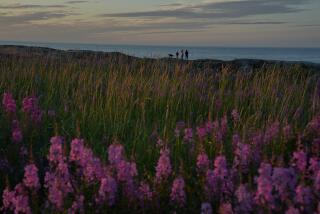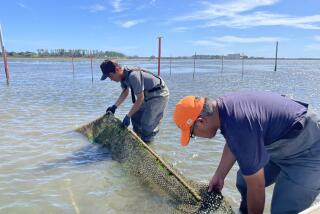Way of Life Is Dying Along With Fish in Canada : Newfoundland: Fishermen in a remote region pay the price for their success at harvesting the spoils of the sea.
- Share via
BELLEVUE, Canada — Those seeking the reason why Canada, long the champion of international law and conciliation, suddenly has turned into the rogue cop of the high seas can find it in the idled fishing villages of Newfoundland.
For hundreds of years, boats out of Bellevue and similar outports, as isolated fishing villages are known here, have drawn a livelihood from the thousands of coves and inlets along the ragged coastline of this granite island and from the surrounding Atlantic.
Now the fish--most of them anyway--are gone. Boats rot on the shore. Vacant processing plants accumulate rust. Proud families survive on reluctantly accepted government handouts. The rhythms of seafaring life that have helped define Newfoundland for generations are fading--perhaps forever.
Atlantic Canada is living the legacy of more than a decade of rapacious overfishing and government mismanagement.
But if Canada is a late convert to the cause of conserving the fishing grounds, it is a zealous one. And so, earlier this month, in defiance of international law but to the cheers of most Canadians, its patrol boats ranged beyond its internationally recognized 200-mile limit in pursuit of Spanish ships scooping up one of the few species of deep-dwelling fish still out there.
The Spanish trawler Estai was seized and held for a week while Canadian fisheries authorities rummaged through the 350 metric tons of fish aboard for evidence that its captain had violated North Atlantic conservation standards.
To many in this province, the uncharacteristic burst of national assertiveness was long overdue.
“This . . . puts conservation on the table in front of the world, and that’s where it’s got to be,” said fisherman Robert McCarthy, 38, sitting at the lace-covered table in the dining room of his home here.
“At first when we got into trouble, we thought our own country could solve our problems,” he said. “Now I know that was not so, that our troubles were outside 200 miles as well as inside, right? . . . Even if we cleaned up our act . . . as long as there is fishing activity going on outside 200 miles with very little control on it, then basically we’re beating a dead horse.”
McCarthy’s family has been fishing out of Bellevue since it was first settled in about 1800 by Irish Roman Catholics fleeing poverty in their homeland. The village, spread over the wooded banks of a cove with the unlikely name of Tickle Bay, in many ways is typical of the continuity of life in the tiny outports that ring Newfoundland.
Like most of their neighbors, McCarthy and his wife, Joan, the local postmaster, built their two-story frame house with their own hands, using wood they harvested from the nearby forest and cut in the village sawmill across the road. McCarthy built his first large fishing boat, a 35-footer, the same way, under the guidance of his father, John, and grandfather Owen.
He took over the fishing business from his father 20 years ago, and since then two of his eight siblings, brothers Gordon, 37, and Derrick, 34, have joined him.
Bellevue has mainly supported an inshore fishery, as have many Newfoundland outports. That means boats here have fished within the protected waters of the coves and bays rather than venturing out onto the open sea.
“My father made his living in Tickle Bay,” McCarthy said. And he himself tied his cod traps and dropped his nets as previous generations of McCarthys had done.
The inshore fishing grounds, however, were in effect the summertime stop for the cod and other fish that swam the currents of the Grand Banks. When the fish began to die out, the inshore fishermen were among the first to feel the effect.
The salmon were the first to go, several years back. Then the cod, mainstay of the Newfoundland industry since the 1600s, all but disappeared and since 1991 have been off limits to Newfoundland fishermen within the 200-mile limit.
Gradually, other species have been added to the moratorium list. As a result, an estimated 30,000 to 50,000 fishermen and others in fish-related industries have lost work here and in other Atlantic provinces.
Because McCarthy and his brothers were foresighted, or lucky, enough to diversify in the 1980s and obtain licenses to catch a variety of fish and shellfish, most notably crab, they have weathered the squall better than most. Those licenses are all but impossible to buy today, and most fishermen in Bellevue are dependent on compensation payments the government authorized when it placed the moratorium on cod. The program has cost the government more than a billion dollars, and Canada is looking for ways to curtail it.
“People have basically given up and stopped fishing altogether,” McCarthy said.
“Right now in this community today, you should be able to go out the door and hear hammers banging, men singing out, see the smoke coming out of the chimneys in the twine stores (where the nets are held), fellows moving around with lumber on their backs because they’d be preparing their boats for the spring fishery,” he said.
The decline has reverberated throughout the economy of the province, which includes Labrador, a sparsely populated region on the mainland next to Quebec.
The official unemployment rate is the highest in Canada at 19%--a figure many believe is deceptively low because of the number of people who have given up looking for work. The number of people on welfare has jumped more than 26% in the last three years, to 71,600 in a province with a population just over 582,000.
Few here doubt that the principal reason for the decline is overfishing through the 1980s, compounded by Canadian government quotas that overestimated the number of fish available and encouraged expansion of the industry through subsidies and other incentives right up until the cod moratorium in 1991.
“We are, in large part, authors of our own disaster,” acknowledged Earl McCurdy, president of the local fishermen’s union.
“We’ve all got skeletons, I suppose,” McCarthy said. “Conservation never became an issue until fish started getting scarce. . . . I suppose everybody was of the opinion there was no way to catch it all.”
But all-season factory trawlers, fish-finding sonar and other technological advances have made it clear that if people can’t catch every fish in a region, they can come close.
“They (factory ships) could just chase the fish and chase it, even on its offshore breeding grounds, up off Labrador,” McCarthy said.
“When they got up there in winter, I said, ‘We’re in trouble, eh, because how’s the fish going to swim back here . . . in the summer if somebody’s up there in winter . . . robbing the nest?’ ”
Particularly frightening for fishermen are the latest scientific studies showing a continued decrease in fish stocks in Canadian waters despite the moratoriums and other restrictions.
As a result, Canada has moved to extend its jurisdiction over all of the Grand Banks, including the part that extends beyond the 200-mile limit. That places it in conflict with the 15-nation European Union, although mainly Spain and Portugal, whose far-ranging fishermen have worked the Grand Banks for about as long as those from Newfoundland.
Canada frames the matter as conserving fish stocks--in this case turbot, or Greenland halibut--that roam between Canadian and international waters. The European Union, however, views it as a question of international law, with Canada playing vigilante.
Like most Newfoundlanders, McCarthy sees enforced conservation as the best hope for a comeback in the fishery here, but he has advised son Ronald, 20, to continue his education in naval architecture in St. John’s in case the fishing business is not there for him to inherit.
“I don’t know what I’d be able to do if in five years I can’t go fishing,” he said. “This life I got here, I love. I know everybody here. You get up in the morning and hear the birds chipping and chirping in the trees while you get your breakfast. I don’t think there’s anything better than that, you know. Then you get in your boat, steam up the bay, see whales blowing. . . . Each day has its own beauty.”
More to Read
Sign up for Essential California
The most important California stories and recommendations in your inbox every morning.
You may occasionally receive promotional content from the Los Angeles Times.













